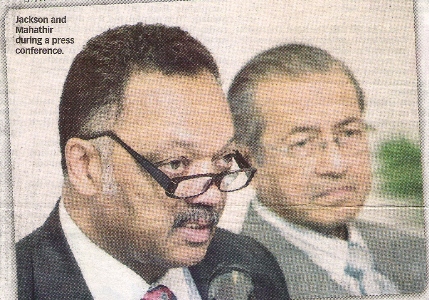|
The Sun, 21 April 2009

CYBERJAYA: The current global financial crisis is a opportune time to initiatechanges by globalising human rights, workers’ rights, protect women and children and save the global environment, Rev Jesse L. Jackson said yesterday.
To this end, he said, the new administration in the United States has evoked hopes that there would be a reconstruction of the world and nternational relations.
Speaking at the Bridges Dialogue, a programme aimed at building a culture of peace and development in a glzibalised world, at the Multimedia University here, he said: “Our crisis comes because we have globalised capital, but not globalised human rights. We have not globalised workers’ rights. We have not giobalised rights for women, rights for children and environmental protection.
“Capital can move quickly, seek out poverty wages and slavelabour, and leave behind devastated communities and unfathomable pain, while finance can circle the globe at the click of a button and trillions of dollars in wealth can disappear in moments.
“Jobs vanish on the whims of a small elite group of corporate and financial ‘bank-sters’ and nations are played off against weaker nations The gap between the wealthy and the destitute has grown to unimaginable magnitudes.” - He said the crisis hasnow hit hard because so-called financial geniuses pretended to understand the future but did not learn the lessons of the.past.
Jackson also spoke about the reconstruction of the wedd which the new US admnistration could do by rebuilding international, foreign and epmic policies, international institutions to make them more inclusive and cooperative, rejoining the international treaties the previous administration had abandoned and expanding them to include more people, more protection and more nations.
“We need world economy that is based on just one set of rules for the privileged as well as the poor and we need a G200 meeting, not just a G20 or G2 conference where the minority make decisions for the rest of the world.”
Jackson also spoke about foreign policies but was non- committal on the issue of Israeli-occupied Gaza, saying that he hoped the new US administration would be able to work out a solution. “If not this is a crisis that could expand to poison the whole region and then the whole world, he said.
However, panellist and former premierTun Dr Mahathir Moliamad disagreed with Jackson, saying: “our culture and value systems are different so you cannot apply the same laws to developed and non-developed nations and those less developed than Malaysia.”
While nothing that it was refreshing that President Barack Obama was reaching out to leaders, Mahathir said: “After listening to Jackson, it seems to me that America can change everything except its commitment to Israel.”
Fellow panellist and political scientist Dr Chandra Muzaffar also expressed doubt about Obama’s pledge to pull out of Iraq, saying that control of the oil and ensuringthat the country is rnoulded towards US policies are still in play.
When answering questions on peace in Malaysia and if this had been marred by political conflicts, Mahathir said despite all this, there is peace.
“It is not perfect but we are a lot better compared to other multiracial and multi- religious countries. We in Malaysia feel that we are the worse lot of people and we quarrel all the time, we think we are worse off than everyone else, but those who come from outside see things differently.”
|
